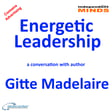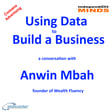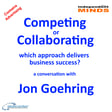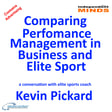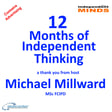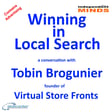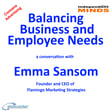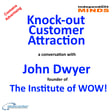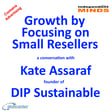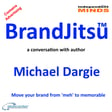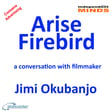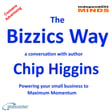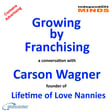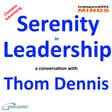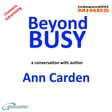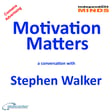
The AHA effect – a conversation with author Dr Michael Gerharz
Learn how to create the AHE effect every time you deliver a presentation or communicate with another person regardless of format.
Dr Michael Gerharz is a communications expert who helps business people find the right words not just to explain a message but achieve the desired outcome from an audience.
In his book The AHA Effect Dr Gerharz explains why business communications go wrong, and what managers need to do to make their communications more effective.
In this episode of The Independent Minds Dr Gerharz explains to host Michael Millward how many bright ideas never get beyond the first time their creator presents them to other people, because that creator delivers the presentation in the wrong way.
Dr Gerharz explains the difference between creating a WOW! moment and delivering an AHA effect, and the reasons why many presenters focus on the former.
Michael shares experiences of some of the presentations he has delivered and reflects on whether he has created WOW! moments or AHA effects.
You will leave this episode more conscious of how your own presenting and communication style might be improved.
More information about Dr. Michael Gerharz and Michael Millward is available at abeceder.
Audience Offers
The Independent Minds is made on Zencastr, because as the all-in-one podcasting platform, Zencastr really does make creating content so easy.
If you would like to try podcasting using Zencastr visit zencastr.com/pricing and use our offer code ABECEDER.
Travel
With discounted membership of the Ultimate Travel Club, you can travel anywhere else at trade prices on flights, hotels, trains, and many more travel related purchases.
Fit For Work Look after your health and you will be fit for work.
No point in being in a great job if you are in poor health. That is why we recommend The Annual Health Test from York Test; a 39-health marker Annual Health Test conducted by an experienced phlebotomist with hospital standard tests carried out in a UKAS-accredited and CQC-compliant laboratory.
A secure Personal Wellness Hub provides easy-to-understand results and lifestyle guidance
Visit York Test and use this discount code MIND25.
Visit Three for information about business and personal telecom solutions from Three, and the special offers available when you quote my referral code WPFNUQHU.
Being a Guest
We recommend the podcasting guest training programmes available from Work Place Learning Centre.
We use Matchmaker.fmto connect with potential guests If you are a podcaster looking for interesting guests or if you have something interesting to say Matchmaker.fm is where great guests and great hosts are matched and great podcasts are hatched. Use our offer code MILW10 for a discount on membership.
We appreciate every like, download, and subscriber.
Thank you for listening.

